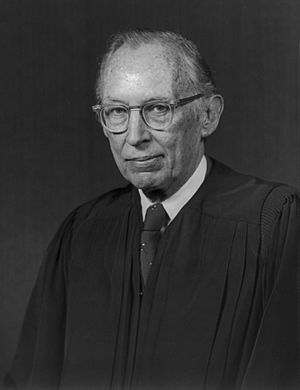Caban v. Mohammed facts for kids
Quick facts for kids Caban v. Mohammed |
|
|---|---|

|
|
| Argued November 6, 1978 Decided April 24, 1979 |
|
| Full case name | Abdiel Caban, Appellant, v. Kazim Mohammed and Maria Mohammed. |
| Docket nos. | 77-6431 |
| Citations | 441 U.S. 380 (more)
99 S. Ct. 1760; 60 L. Ed. 2d 297; 1979 U.S. LEXIS 92
|
| Prior history | Matter of David A.C., 56 A.D.2d 627, 391 N.Y.S.2d 846 (App. Div. 2d Dept. 1977); appeal dismissed, 43 N.Y.2d 708, 401 N.Y.S.2d 208, 372 N.E.2d 42 (1977); probable jurisdiction noted, 436 U.S. 903 (1978). |
| Holding | |
| The sex-based distinction in New York's Domestic Relations Law between unmarried mothers and unmarried fathers violates the Equal Protection Clause of the Fourteenth Amendment because it bears no substantial relation to any important state interest. | |
| Court membership | |
| Case opinions | |
| Majority | Powell, joined by Brennan, White, Marshall, Blackmun |
| Dissent | Stewart |
| Dissent | Stevens, joined by Burger, Rehnquist |
| Laws applied | |
| Equal Protection Clause | |
Caban v. Mohammed was an important case decided by the United States Supreme Court in 1979. It dealt with family law and fairness. The case questioned a New York state law. This law said that only unmarried mothers could stop the adoption of their children. Unmarried fathers did not have the same power. The Supreme Court had to decide if this law was unfair or discriminatory.
What Was the Case About?
At the time, a New York law called Section 111 of the Domestic Relations Law was in place. This law had different rules for parents who were married and those who were not.
- If parents were married, both parents had to agree to an adoption.
- If parents were not married, only the mother's agreement was needed for adoption.
Abdiel Caban and Maria Gonzales lived together for five years. They had a son and a daughter during this time. After they separated in 1973, Maria married Kazim Mohammed. Two years later, Kazim wanted to legally adopt Caban and Maria's children.
Abdiel Caban had also married a new wife, Nina. He and Nina also wanted to adopt the children. However, because of Section 111, Caban's attempt to adopt was blocked. The Mohammeds' request to adopt the children was approved instead.
Caban felt this was unfair. He appealed the decision to higher courts in New York. When those appeals failed, he took his case to the United States Supreme Court. He argued that the law violated his rights to equal protection and due process under the Constitution. This means he believed the law treated him unfairly because he was an unmarried father.
New York state defended its law. They argued that allowing unmarried fathers to stop adoptions might make it harder for children to find loving homes. They believed this would not be in the children's best interest.
The Supreme Court's Decision
The Supreme Court heard the case and made a decision. The Court was split 5-4, meaning five justices agreed with Caban, and four disagreed. Justice Lewis F. Powell, Jr. wrote the main opinion for the majority.
The Court decided that Section 111 of New York's law was unconstitutional. It said the law unfairly treated people differently based on their sex. This went against the Fourteenth Amendment, which guarantees equal protection for everyone.
Justice Powell explained that Caban had created a "natural family" by living with his partner and children for five years. Because of this, he deserved legal rights to his children. The Court found that treating mothers and fathers differently in Section 111 did not have a strong reason. It did not truly help the state's goal of finding homes for children whose parents were not married.
The Court did not decide if the law also violated due process. They also did not decide if it was unfair to treat fathers differently based on whether they had been married or not.
Two justices, Justice Stewart and Justice Stevens, disagreed with the majority. They wrote separate opinions explaining why. Justice Stewart believed that mothers and fathers were different because mothers carry the child during pregnancy. He felt this difference, along with the state's interest in helping children get adopted, was a good reason for the law to treat unmarried mothers and fathers differently. Justice Stevens agreed, saying that being a biological mother created important physical and emotional differences in parenting.
What Happened After the Ruling?
Because of the Supreme Court's decision, Abdiel Caban got back the visitation rights he had for his children. These rights had been taken away when Kazim Mohammed was granted adoption.
 | Dorothy Vaughan |
 | Charles Henry Turner |
 | Hildrus Poindexter |
 | Henry Cecil McBay |


